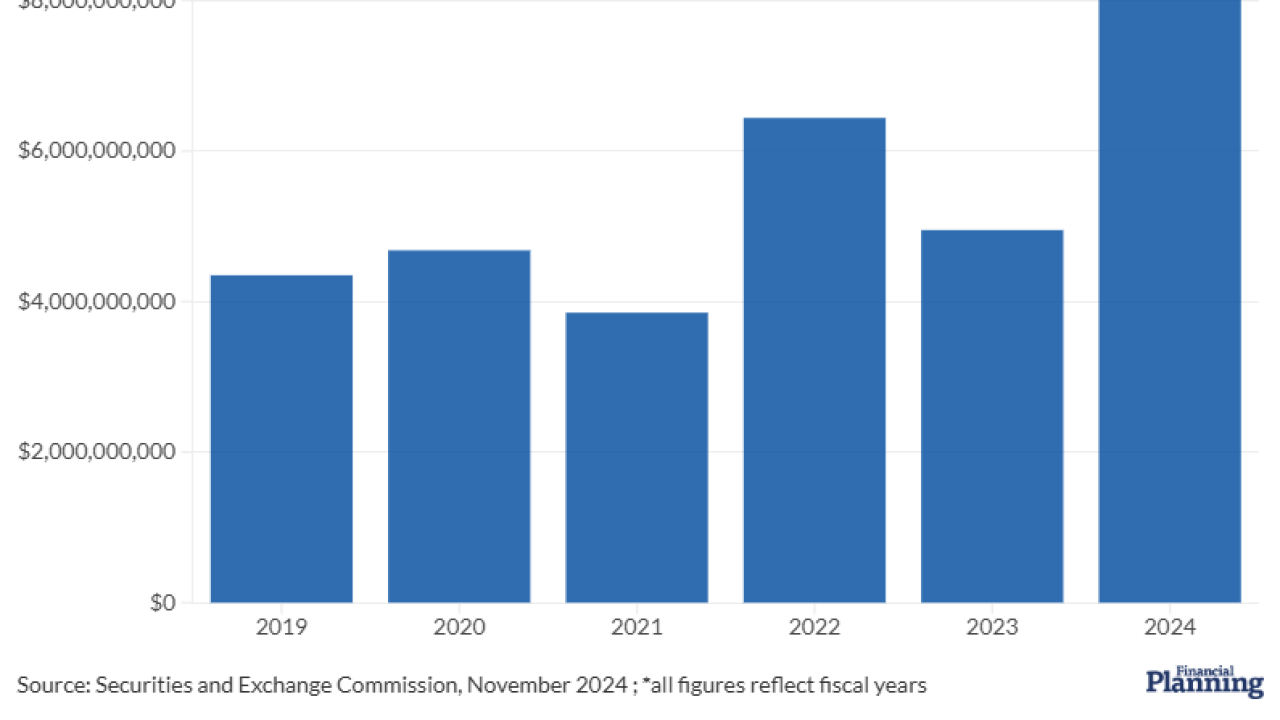When does listing investment options for a client cross the line into becoming a recommendation?
That's one of the big questions regulators at the
"Some say, 'We are just acting as a finder. We just bring parties together,'" Wrona said. "But just be careful … because we've found that even if firms think they don't make recommendations, sometimes they do."
Wrona and his fellow speakers at a morning panel warned that firms that cross over into making recommendations run the risk of violating the industry's Regulation Best Interest rule. The nearly 3-year-old rule calls on brokers to always look out for their clients' best interests and to avoid conflicts of interest when possible. Conflicts that can't be eliminated must be disclosed.
It's generally considered less strict than the fiduciary standard, which requires financial advisors to put client interests first at all times, even if it results in less profits for the advisor or their firm.
Nicole McCafferty, FINRA's examinations director, said there's no strict definition of what constitutes a recommendation. The picture is further clouded by the increasing use of automated investing and so-called artificial intelligence systems that can provide advice independent of human beings.
Julie Glynn, a managing director and assistant general counsel at JPMorgan Chase, said many robo advisors have tried to stop short of giving recommendations by leaving investment decisions explicitly in the hands of clients.
"They don't think they are making recommendations because they are operating under the self-directed model," Glynn said. "But I'd be careful with that."
Yet, despite regulators' repeated warnings about Reg BI, enforcement so far has been slow. FINRA
Wednesday's panels came with yet more warnings that brokerage firms' time to get their houses in order and
The first has to do with failures to fill out fully or correctly a disclosure document known as a Form CRS — short for Customer Relationship Summary. The second concerns instances when firms have not revised their internal policies and procedures to comply with the Reg BI.
The third — and the most serious from a regulators' perspective — involves actual violations of Reg BI's conduct standards.
"You'll see more and more cases in the third bucket, dealing with the disclosure obligation, the care obligation and the conflict of interest obligation, as we move forward with the year," Kelly said.
Much of the discussion Wednesday also centered on a staff bulletin the SEC began circulating on April 21 to call attention to Reg BI's duty of care. That duty makes brokers responsible for looking out for clients' best interests using a reasonable understanding of their investing goals.
The bulletin emphasized that brokers can't meet their duty of care unless they make it a point to weigh the pros and cons to any alternatives to investment recommendations they might be making. That's especially true, according to the SEC, when it comes to complex and obscure products like private equity funds, cryptocurrency and other digital assets, derivatives and assets bought using borrowed money.
Broker-dealers don't necessarily have to go to the trouble of explaining in writing the reasons behind every transaction they carry out on behalf of clients. But there are instances when regulators will almost certainly want documentation to back up brokers' actions, McCafferty said.
McCafferty said it's not a bad idea to make note of the times when a client specifically goes against a broker's advice. Brokers would also do well to explain in writing any recommendation that doesn't — at first glance at least — comport with a client's risk tolerance or investing goals.
McCafferty said she often hears brokerage representatives say they see no need for written justifications for advice given to long-time customers. Brokers often maintain that these lengthy relationships imply a high degree of trust in their recommendations.
But what happens, McCafferty asked, if the client should die and the account is taken over by a child or other close relation?
"If the rep is without any documentation, it's hard to have a leg to stand on as to why they were making recommendations in the client's best interest," she said.
Glynn said the SEC's staff bulletin also made it clear that regulators don't view Reg BI as being especially different from the fiduciary rule governing the conduct of investment advisors. That rule calls on advisors to always put their clients first and to eliminate all but the most unavoidable conflicts of interest.
Glynn said the specific requirements of Reg BI and the fiduciary rule may differ in details, "but regulators are thinking of these standards in very similar ways in terms of outcomes," she said.
Those were just a few pieces of advice McCafferty and her fellow speakers had for the audience at FINRA's annual meeting. For most of the week, regulators and representatives of brokerage firms will be offering their thoughts at a series of roughly hour-long sessions on the latest compliance trends and developments in the industry.
At Wednesday's panel on enforcement trends, Kelly said regulators will also be paying particular attention to hybrid firms that have not only a broker-dealer but also an advisory arm registered with the SEC. These sorts of firms need to be doubly cautious about how they charge customers, he said.
Kelly said he knows of at least one firm in which a broker charged a client a commission to buy an annuity and then quickly moved the annuity over into an advisory account with an ongoing management fee.
"There does seem to be a small number of brokers who take advantage of the different fee structures by moving accounts back and forth," he said.
Gurbir Grewal, the director of the SEC's enforcement division, said firms that have caught regulators' notice would do well to pick their battles and consider at least some cooperation.
"If you have an attorney who comes in and fights tooth and nail on every allegation, I think you lose credibility," Grewal said. "I think it's a very rare case when the staff gets every last factual detail wrong, because we aren't that bad."








